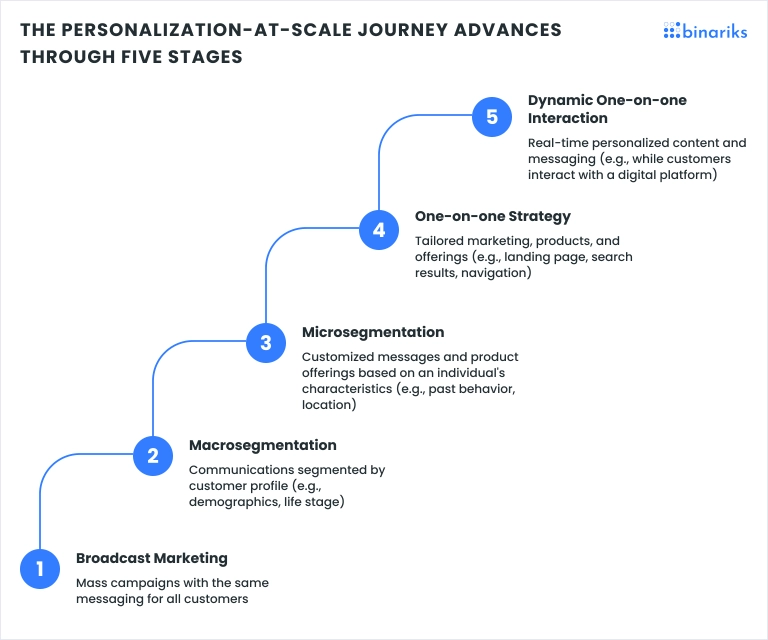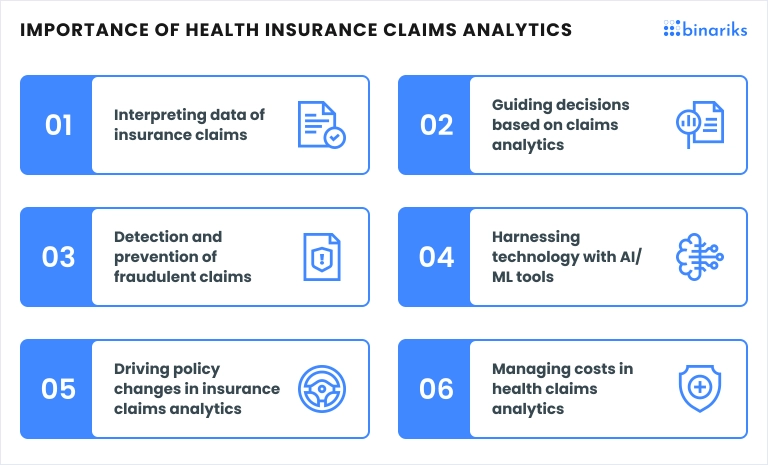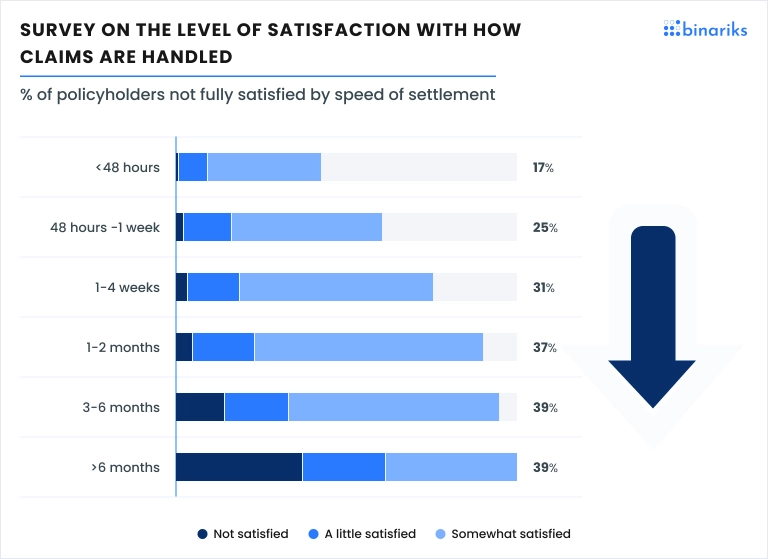The customer experience in insurance is undergoing a significant transformation as clients demand a more tailored and seamless journey. No longer satisfied with one-size-fits-all policies, today's customers expect tailored products, digital convenience, and transparent interactions. This shift pushes insurers to place personalization at the core of their strategies.
Technology is at the forefront of reshaping the insurance industry, with advancements and digital platforms playing a pivotal role. From harnessing big data to utilizing AI for precise policy recommendations, insurers are revolutionizing every aspect of the customer journey to meet the changing expectations.
In this article, you'll discover how:
- Personalized insurance policies are crafted to meet individual needs.
- Digital transformation is redefining customer engagement within the insurance sector.
- AI and machine learning are used to predict customer needs and improve risk assessment.
- Key insurtech trends are driving the future of the insurance industry.
Ready to see how insurers are adapting to changing customer expectations? Keep reading to uncover the latest insights and strategies.
Why personalization is key in insurance
The expectations of modern customers in the insurance industry have evolved significantly, driven by technological advancements and the demand for personalized experiences. According to a McKinsey report on personalized insurance, customers today expect tailored and transparent interactions, making the insurance customer experience a crucial factor in purchasing decisions.

Personalized interactions significantly increase customer satisfaction and retention, with tailored services fostering stronger relationships between clients and their insurers. By offering policies that meet individual needs, insurers create value and trust, improving the insurance customer journey and making the process of purchasing, understanding, and managing policies more seamless (Source ).
Engagement is another essential aspect influenced by personalization. As insurers adopt digital platforms and data-driven solutions, they can provide tailored products that enhance customer engagement by directly addressing customer needs. This targeted approach boosts satisfaction and loyalty and reduces policy cancellations, a critical aspect of long-term business growth.
Additionally, personalization impacts critical areas of the insurance process, such as risk assessment and pricing. By leveraging data to understand customer profiles deeply, insurers can better manage risks and refine their offerings, leading to more accurate insurance risk prediction . Such an approach benefits customers through more relevant policies while enabling insurers to stay competitive in a rapidly evolving market.
The role of data in crafting personalized insurance policies
In today's evolving customer journey in the insurance industry, data is crucial in delivering the personalized experiences that modern clients expect. The automatic collection and analysis of big data enable insurers to understand their customers better, allowing for more accurate and tailored policy offerings.
According to a Forbes article on data analytics in insurance, leveraging large data sets can transform how insurers assess risks, predict customer needs, and craft personalized policies (Source ).

The use of diverse types of data is essential in this process:
- Personal data: Includes lifestyle preferences and habits that help insurers build a comprehensive customer profile, ensuring policies meet specific requirements.
- Medical data: Vital for health-related coverage, allowing insurers to offer plans that align with an individual's health history and potential needs.
- Financial data: Guides the creation of suitable financial plans by determining the customer's ability to afford certain premiums.
Together, these data points help overcome challenges in the insurance customer experience by delivering personalized policies that deeply resonate with individual needs, fostering a stronger connection with the end-users.
Automatic data collection not only aids in policy customization but also provides valuable insights into insurance customer experience trends. Understanding customer behavior, preferences, and purchasing habits helps insurers stay ahead of the curve and adjust their offerings accordingly.
Moreover, data analysis enables a more dynamic and responsive insurance experience, allowing real-time policy adjustments and recommendations.
AI and machine learning: Revolutionizing the insurance customer journey
AI and machine learning are transforming how insurers interact with their customers, improving how they predict needs, tailor policy options, and deliver more efficient services. Adopting these technologies enhances customer experience in insurance by providing faster and more accurate solutions.
Predicting customer needs and tailoring offers
According to recent research on AI in insurance, AI enhances customer interactions and increases efficiency in claims and underwriting. By quickly processing large volumes of data, AI and ML allow insurers to understand customer behavior, preferences, and risk profiles. This helps insurers predict customer needs more accurately, enabling them to create personalized policy offers that match individual requirements.
For example, AI can assess a client's risk based on historical data and recommend tailored products, which enhances the overall customer experience metrics for insurance.
Enhancing accuracy and reducing risk
AI and ML technologies also improve policy selection accuracy and help mitigate risks. Insurers leverage these technologies to analyze various data sources, including claims history, lifestyle, and even real-time data from smart devices. This deep analysis aids in developing policies that are more aligned with customers' unique situations, reducing the risk of policy mismatches. Moreover, such technologies can automate claims processing, leading to faster settlements and fewer errors.
For example, Compensa Poland, a member of the Vienna Insurance Group, implemented an AI-driven claims handling system, which led to a 73% increase in cost efficiency and higher customer satisfaction. This demonstrates how AI can streamline operations, enhance decision-making, and improve customer interactions (Source ).

Streamlining the customer journey with automation
One of the key ways to improve customer experience in insurance is by using AI to automate repetitive processes and administrative tasks. For instance, up to 40% of underwriting tasks are non-core activities, and incorporating AI can reduce this inefficiency.
Automating processes like claim status checks through AI-driven tools, such as chatbots or mobile applications, enables a smoother experience for policyholders and reduces waiting times.
The shift toward personalized insurance policies
Insurers are increasingly moving from standard, one-size-fits-all policies to customized solutions tailored to individual clients' needs. According to a Deloitte industry outlook, personalization is one of the key factors in enhancing insurance customer satisfaction and fostering long-term loyalty (Source ).
From standard to customized solutions
The traditional insurance model no longer fits modern demands. Insurers are adopting data-driven approaches to improve customer engagement in insurance by creating policies that align with unique customer profiles. The main stages of this process include:
- Data Collection & Analysis: Gathering lifestyle, health, and financial information to understand client needs.
- Tailored Policy Development: Using this data to develop personalized coverage, such as lower premiums for safe drivers based on telematics data.
- Customer Engagement: Leveraging digital channels to communicate relevant policy updates and offer tailored services.
- Continuous Improvement: Utilizing AI and analytics to dynamically adjust policies as customer needs evolve.
Innovative digital tools like mobile apps enable real-time policy management, significantly improving customer touch points in insurance. Integration with business intelligence solutions helps insurers predict customer needs and provide targeted offers. Additionally, wearables and IoT devices are used to craft tailored health plans, rewarding customers for healthier behaviors with discounts.
Embrace InsurTech innovation with custom software development
Customer-centric insurance
Insurance companies are rapidly adapting their digital channels to offer a seamless and personalized customer experience:
- Personalized policy selection: Insurers are developing user-friendly digital platforms, such as mobile apps and online portals, allowing customers to view, compare, and select customized policies easily. These channels offer real-time updates, making it simple to access and modify coverage whenever needed.
- AI-powered customer service: Automation tools like AI chatbots and virtual assistants provide 24/7 support, handling routine inquiries quickly and accurately. This improves customer service in insurance by offering instant guidance throughout the policy selection process, reducing the need for human intervention on simple issues, and ensuring a smoother experience.
- Seamless policy adjustments & purchases: Digital platforms enable quick and easy policy adjustments and straightforward purchases, removing traditional barriers such as paperwork or lengthy processes. Automation helps analyze customer data to recommend policies that match individual preferences, simplifying referrals and the buying journey.
- Enhanced customer experience & retention: Focusing on digital convenience and automation improves insurance customers' journey with more efficient processes and personalized services. This leads to increased satisfaction, stronger engagement, and improved customer retention.
By enhancing their digital presence and leveraging automation, insurers provide their customers smoother journeys to select and purchase policies, ensuring that clients find the right coverage with minimal effort.
How personalization changes risk assessment
Personalization is significantly transforming the underwriting process in insurance by enabling more accurate and individualized risk assessments. Insurers can analyze personal data, such as lifestyle habits, medical history, and real-time behavior, using a data-driven underwriting approach.
This shift allows for more precise risk evaluations, leading to tailored policies that better reflect the customer's unique profile and needs. Advanced technologies, like AI and machine learning, further refine this process by automating the analysis and identifying patterns that may impact risk levels.
As a result, personalization not only enhances the accuracy of policy pricing but also improves customer satisfaction by offering fairer, more transparent premiums. Additionally, it allows insurers to proactively identify potential risks and provide customized solutions, enhancing the overall customer experience and fostering trust between clients and insurers.
For more insights on this, check out how data-driven underwriting is shaping the future of insurance.
Personalization and transparency for building trust in insurance
Personalization and transparency are crucial to fostering trust between insurers and customers. By offering tailored policies and clear, open communication, insurers can address customer needs more effectively while ensuring clients fully understand their coverage. This transparency builds trust and strengthens customer loyalty, as clients feel their interests are prioritized.
- Clear policy terms: Personalized policies come with straightforward explanations, making it easier for customers to comprehend their coverage.
- Real-time updates: Digital platforms allow instant access to policy changes and real-time information, providing transparency and reducing confusion.
- Customized risk assessment: Transparent communication on how personalized factors affect pricing and coverage builds confidence in the fairness of the underwriting process.
- Proactive customer support: Personalized interactions, such as tailored notifications or recommendations, ensure clients feel supported and valued throughout their insurance journey.
Conclusion
The evolving landscape of insurance demands a shift toward personalization, data-driven decision-making, and transparent customer interactions. Insurers that embrace these trends are better equipped to meet modern customer expectations, provide tailored policies, and foster lasting trust and loyalty. By leveraging digital platforms, AI, and big data analytics, the insurance experience becomes more streamlined, customer-centric, and efficient.
If your insurance company is looking to enhance its customer journey, personalize policies, and improve digital capabilities, Binariks is here to help. With our expertise in custom technology solutions, we can assist you in navigating the complexities of personalization and transparency to build stronger, more trusted customer relationships.
Share

